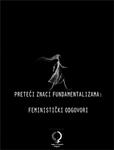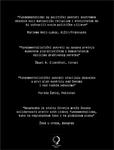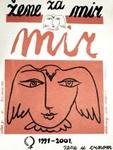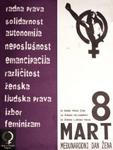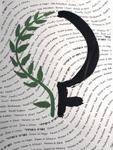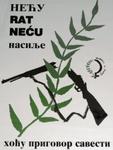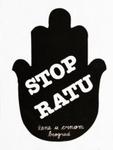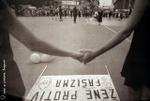Women Against War (Magazine)
type=digital_archives
WE CHOOSE ANTIMILITARISM
Antimilitarism and non-violence are our spiritual orientation and our political choice. We reject military power and the production of arms for the killing of people, of human working nature, and for the domination of one sex, nation, or state over another.
We speak out for recognition of difference, reciprocity, respect for nature, and for development in accordance with the needs of the civil population, and not the civil and military oligarchy and their national interests.
Women have always defended their homelands by their work—the raising of children, giving emotional and material support to the elderly and powerless, all through their invisible and unpaid work in the home. Therefore, we think that our attachment to and love for our countries (homelands) in general does not require that we espouse whatever view held by in the army. We do not what to attain equality with men in that way. On the contrary, men must achieve equality with women by not exerting violence over women and not to making use of the army, but rather through participating in the bringing up of children, in housework, to care for the elderly and powerless….
The participation of women in the army, military institutions, or arms training—whether voluntary or obligatory—displays neither sexual equality nor military democratization. We advocate not only for a society without soldiers (male or female), but also for a society without the militaristic (soldierly) values which produce war, discrimination, violence, and aggression.
WE CHOOSE ANTIMILITARISM
Women in Black
WE ARE STILL IN THE STREETS
On street actions and actions in city squares
International network of women in black
International network of women`s solidarity against war
Curriculum vitae Stasa Zajovic
An Alternative History
Since the beginning of our activities, we have been urging for historical plurality and for writing otherness and difference into history.
The compilations "Women for Peace" represent women's testimonies on war and women's resistance to war, primarily in the area of the former Yugoslavia as well as throughout the world. So far, we have published nine compilations:
- "Women for Peace," 1993, 120 pages, in the local languages, Italian, and English.
- "Women for Peace," 1994, 292 pages, in the local languages, English, and Spanish.
- "Women for Peace," 1995, 296 pages, in the local languages, Spanish, and English.
- "Women for Peace," 1996, 296 pages, in the local languages, English, and Spanish.
- "Women for Peace," 1997, 309 pages, in the local languages, Italian, English, and Spanish.
- "Women for Peace," 1998, 310 pages, in the local languages and English.
- "Women for Peace," 1999, 352 pages, in the local languages and English.
- "Women for Peace," 2001, 400 pages, in the local languages and English.
- "Women for Peace," 2002, 368 pages, in the local languages, and in English in 2003.
- "I Remember," 1995 (reprinted in 1996), 148 pages, in the local languages, Italian, English, and Spanish (testimonies of women refugees).
- "War Deserters in the Former Yugoslavia,, a compilation, 1995, 50 pages, in the local languages, Italian, English, and Spanish.
Magazine "Women against War"
- Issue 1, 1994, 102 pages, texts in the local languages, Italian, English, and Spanish.
- Issue 2, 1994, 102 pages, texts in the local languages, Italian, English, and Spanish.
- Issue 3-4, 1995, 104 pages, texts in the local languages, Italian, English, and Spanish.
- A monograph by Neda Bozinovic, "Women's Issue in Serbia in the 19th and 20th Centuries," 1996 (reprinted in 2003), 276 pages (published in cooperation with Feminist '94).
- A photo-monograph "Women in Black," 2002, 89 pages.
Translations of literary works (in cooperation with Feminist '94):
- Virginia Wolf, "Three Guineas," 2001;
- Audrey Lorde, "Sister/ Outsider “
Educational material
- "Nothing is the same as prior to September 11th," compilation, 2001, 60 pages;
- "We Wish to Dance - We Wish to Play," translation, 2002, 98 pages;
- "Women's Peace Policy," compilation, 2002, 90 pages;
- "By Strengthening the Civic Society, We Create Peace," compilation, 2002, 106 pages;
- "Globalization: Problems, Dilemmas, Answers," compilation, 2003, 180 pages;
- "Women, Health, Disarmament," compilation, 2003, 162 pages.
In addition, over this period we have shaped the look of anti-war resistance, and we have published: women's peace agendas, peace calendars, posters, postcards, stickers, leaflets, flyers, etc.

